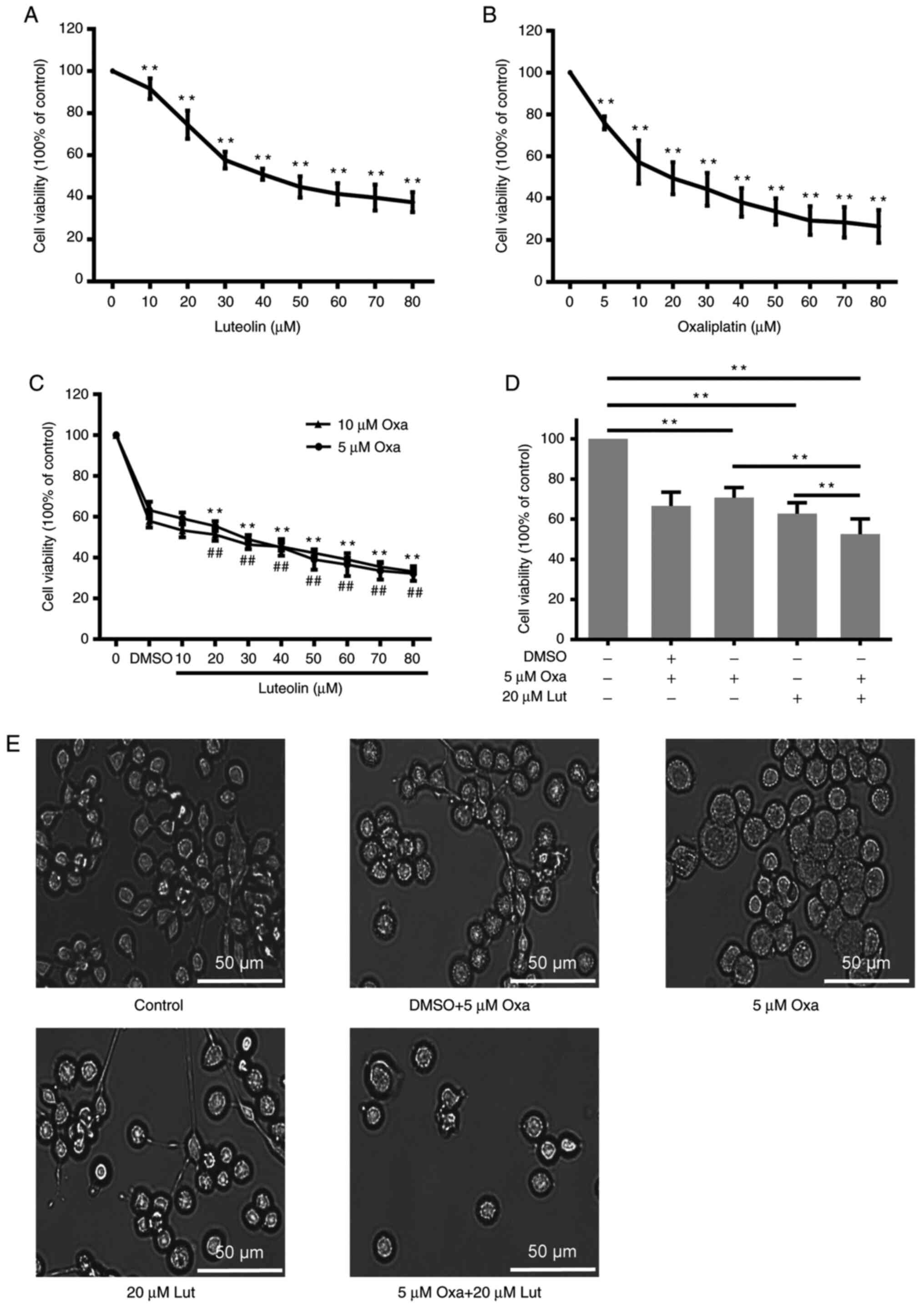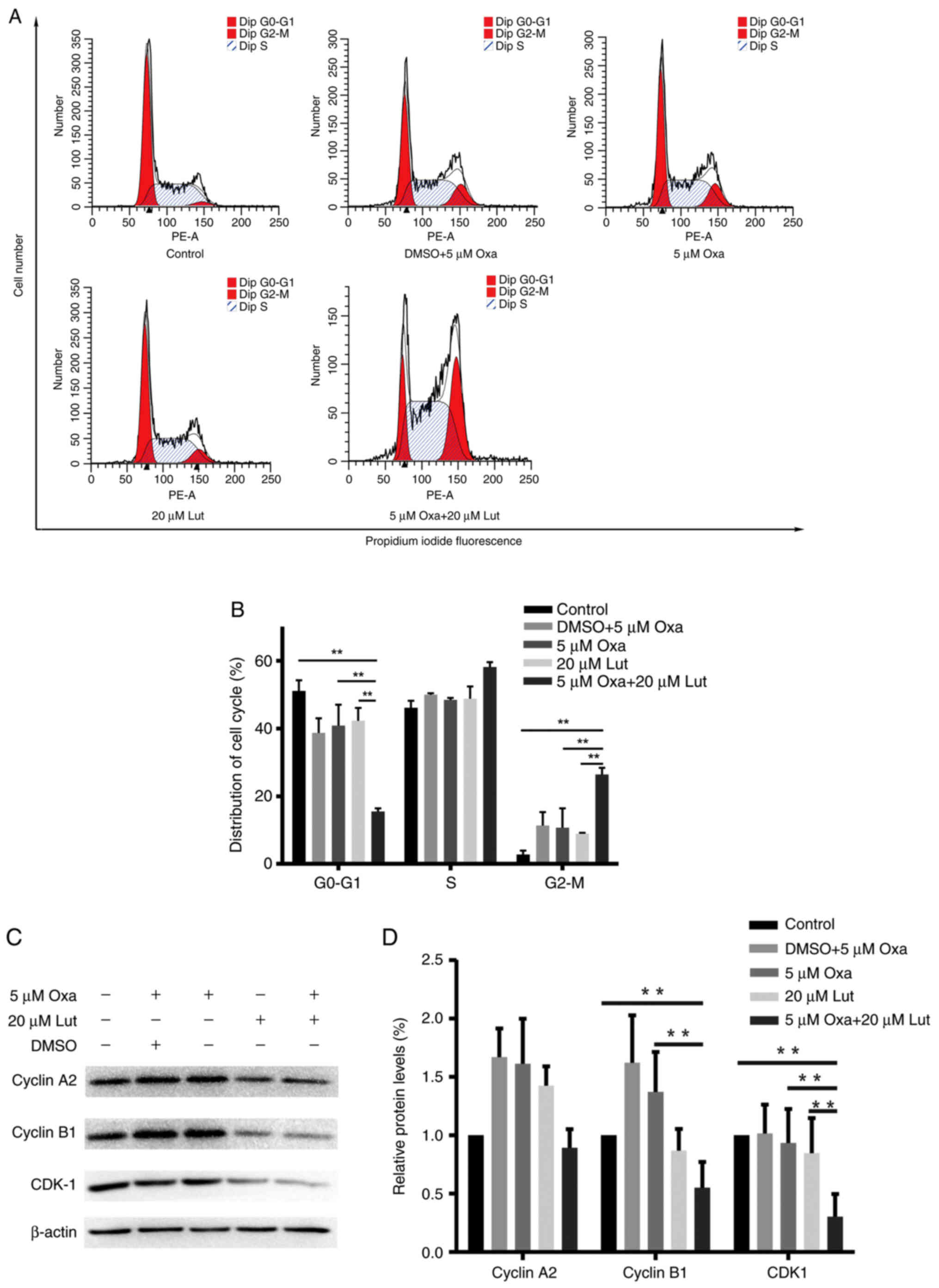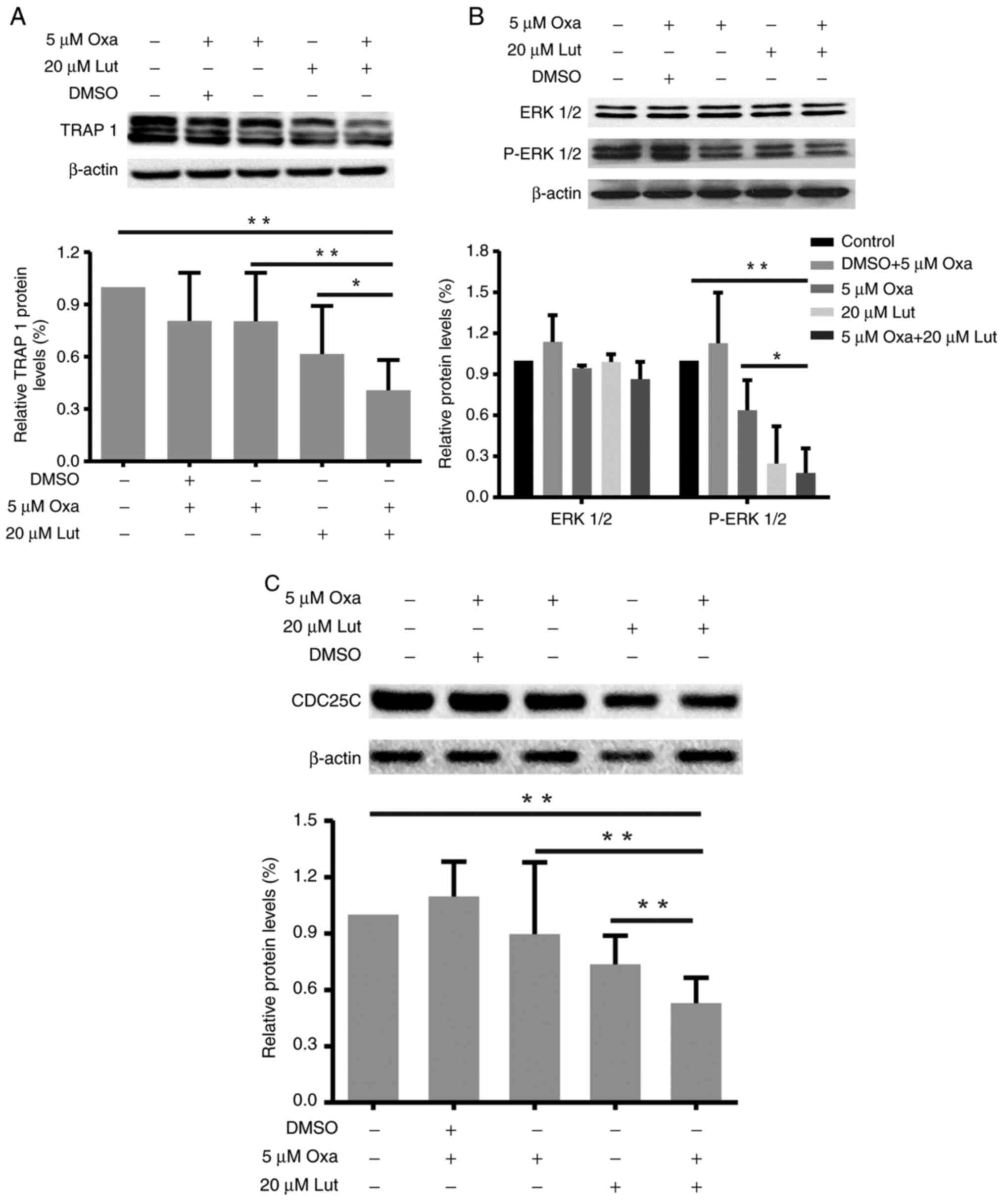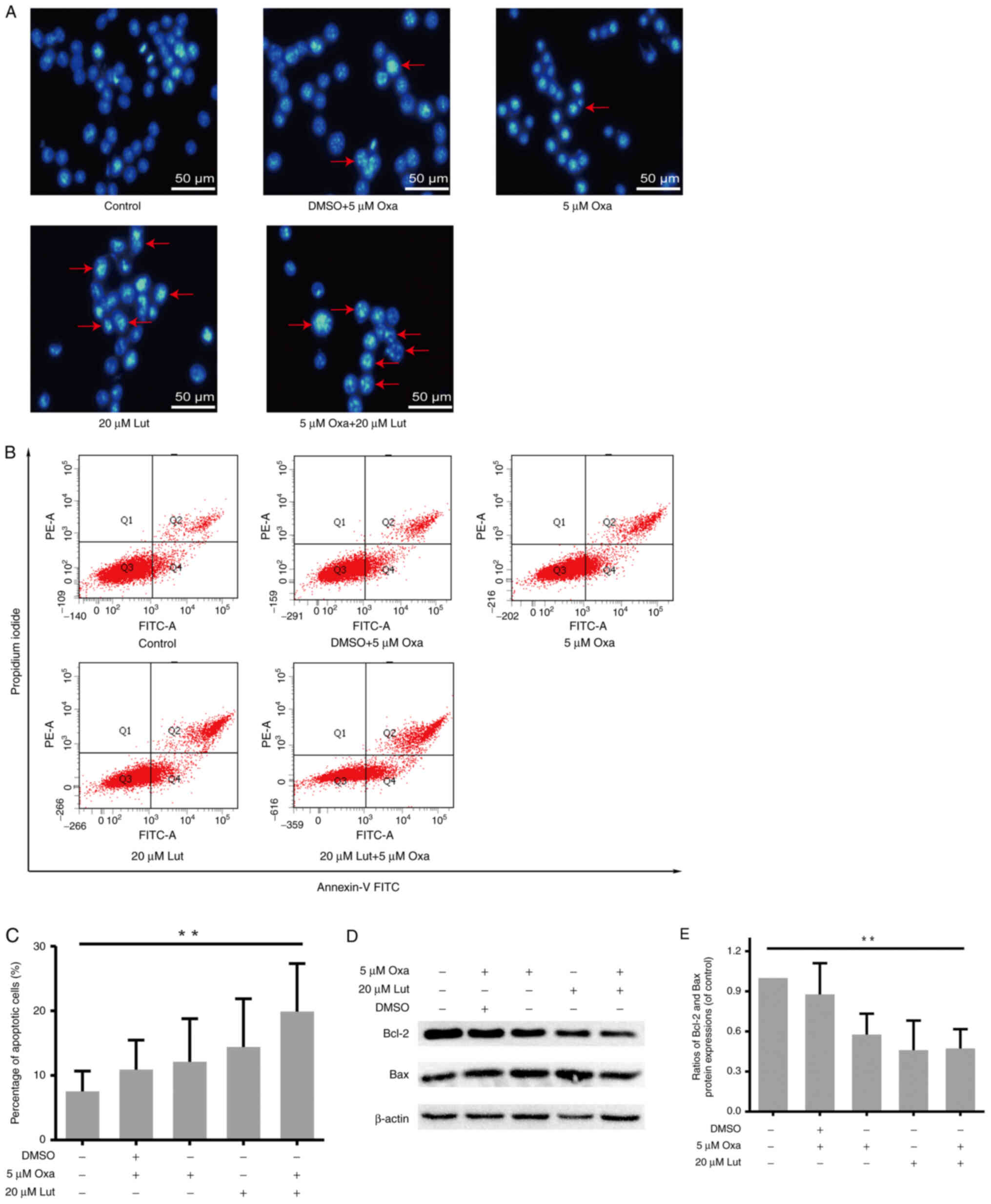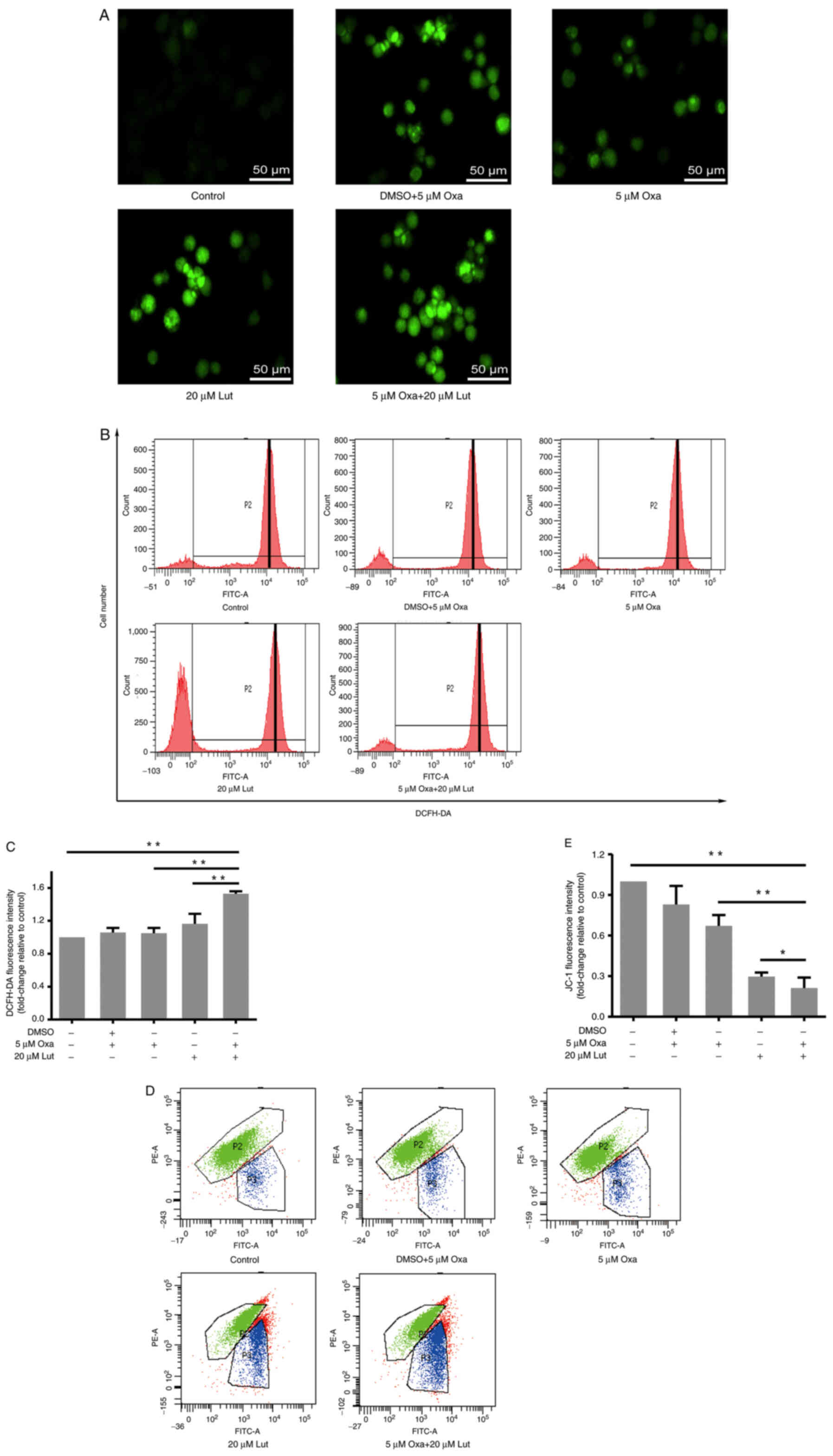|
1
|
Imran M, Rauf A, Abu-Izneid T, Nadeem M,
Shariati MA, Khan IA, Imran A, Orhan IE, Rizwan M, Atif M, et al:
Luteolin, a flavonoid, as an anticancer agent: A review. Biomed
Pharmacother. 112:1086122019. View Article : Google Scholar : PubMed/NCBI
|
|
2
|
Lettini G, Maddalena F, Sisinni L,
Condelli V, Matassa DS, Costi MP, Simoni D, Esposito F and
Landriscina M: TRAP1: A viable therapeutic target for future cancer
treatments? Expert Opin Ther Targets. 21:805–815. 2017. View Article : Google Scholar : PubMed/NCBI
|
|
3
|
Limagne E, Thibaudin M, Nuttin L, Spill A,
Derangère V, Fumet JD, Amellal N, Peranzoni E, Cattan V and
Ghiringhelli F: Trifluridine/tipiracil plus oxaliplatin improves
PD-1 blockade in colorectal cancer by inducing immunogenic cell
death and depleting macrophages. Cancer Immunol Res. 7:1958–1969.
2019. View Article : Google Scholar : PubMed/NCBI
|
|
4
|
Patel TH and Cecchini M: Targeted
therapies in advanced gastric cancer. Curr Treat Options Oncol.
21:702020. View Article : Google Scholar : PubMed/NCBI
|
|
5
|
Wei TT, Lin YT, Tang SP, Luo CK, Tsai CT,
Shun CT and Chen CC: Metabolic targeting of HIF-1α potentiates the
therapeutic efficacy of oxaliplatin in colorectal cancer. Oncogene.
39:414–427. 2020. View Article : Google Scholar : PubMed/NCBI
|
|
6
|
Fujita S, Hirota T, Sakiyama R, Baba M and
Ieiri I: Identification of drug transporters contributing to
oxaliplatin-induced peripheral neuropathy. J Neurochem.
148:373–385. 2019. View Article : Google Scholar : PubMed/NCBI
|
|
7
|
Cao P, Xia Y, He W, Zhang T, Hong L, Zheng
P, Shen X, Liang G, Cui R and Zou P: Enhancement of
oxaliplatin-induced colon cancer cell apoptosis by alantolactone, a
natural product inducer of ROS. Int J Biol Sci. 15:1676–1684. 2019.
View Article : Google Scholar : PubMed/NCBI
|
|
8
|
Riddell IA: Cisplatin and oxaliplatin: Our
current understanding of their actions. Met Ions Life Sci.
18:2018.PubMed/NCBI
|
|
9
|
Stankovic JSK, Selakovic D, Mihailovic V
and Rosic G: Antioxidant supplementation in the treatment of
neurotoxicity induced by platinum-based chemotherapeutics - a
review. Int J Mol Sci. 21:77532020. View Article : Google Scholar : PubMed/NCBI
|
|
10
|
Cao LX, Chen ZQ, Jiang Z, Chen QC, Fan XH,
Xia SJ, Lin JX, Gan HC, Wang T and Huang YX: Rapid rehabilitation
technique with integrated traditional Chinese and Western medicine
promotes postoperative gastrointestinal function recovery. World J
Gastroenterol. 26:3271–3282. 2020. View Article : Google Scholar : PubMed/NCBI
|
|
11
|
Lee YC, Chen YH, Huang YC, Lee YF and Tsai
MY: Effectiveness of combined treatment with traditional Chinese
medicine and Western medicine on the prognosis of patients with
breast cancer. J Altern Complement Med. 26:833–840. 2020.
View Article : Google Scholar : PubMed/NCBI
|
|
12
|
Tang WR, Yang SH, Yu CT, Wang CC, Huang
ST, Huang TH, Chiang MC and Chang YC: Long-term effectiveness of
combined treatment with traditional Chinese medicine and Western
medicine on the prognosis of patients with lung cancer. J Altern
Complement Med. 22:212–222. 2016. View Article : Google Scholar : PubMed/NCBI
|
|
13
|
Martinez-Torres AC, Reyes-Ruiz A,
Benítez-Londoño M, Franco-Molina MA and Rodriguez-Padilla C:
IMMUNEPOTENT CRP induces cell cycle arrest and caspase-independent
regulated cell death in HeLa cells through reactive oxygen species
production. BMC Cancer. 18:132018. View Article : Google Scholar : PubMed/NCBI
|
|
14
|
Ren B, Ye L, Gong J, Ren H, Ding Y, Chen
X, Liu X, Lu P, Wei F, Xu W, et al: Alteronol enhances the
anti-tumor activity and reduces the toxicity of high-dose
adriamycin in breast cancer. Front Pharmacol. 10:2852019.
View Article : Google Scholar : PubMed/NCBI
|
|
15
|
Pu Y, Zhang T, Wang J, Mao Z, Duan B, Long
Y, Xue F, Liu D, Liu S and Gao Z: Luteolin exerts an anticancer
effect on gastric cancer cells through multiple signaling pathways
and regulating miRNAs. J Cancer. 9:3669–3675. 2018. View Article : Google Scholar : PubMed/NCBI
|
|
16
|
Xu J, Xu H, Yu Y, He Y, Liu Q and Yang B:
Combination of luteolin and solifenacin improves urinary
dysfunction induced by diabetic cystopathy in rats. Med Sci
Monitor. 24:1441–1448. 2018. View Article : Google Scholar : PubMed/NCBI
|
|
17
|
Park S, Kim DS, Kang S and Kim HJ: The
combination of luteolin and l-theanine improved Alzheimer
disease-like symptoms by potentiating hippocampal insulin signaling
and decreasing neuroinflammation and norepinephrine degradation in
amyloid-β-infused rats. Nutr Res. 60:116–131. 2018. View Article : Google Scholar : PubMed/NCBI
|
|
18
|
Hashemzaei M, Abdollahzadeh M, Iranshahi
M, Golmakani E, Rezaee R and Tabrizian K: Effects of luteolin and
luteolin-morphine co-administration on acute and chronic pain and
sciatic nerve ligated-induced neuropathy in mice. J Complement
Integr Med. 14:2017. View Article : Google Scholar : PubMed/NCBI
|
|
19
|
Chakrabarti M and Ray SK: Anti-tumor
activities of luteolin and silibinin in glioblastoma cells:
Overexpression of miR-7-1-3p augmented luteolin and silibinin to
inhibit autophagy and induce apoptosis in glioblastoma in vivo.
Apoptosis. 21:312–328. 2016. View Article : Google Scholar : PubMed/NCBI
|
|
20
|
Feng XQ, Rong LW, Wang RX, Zheng XL, Zhang
L, Zhang L, Lin Y, Wang X and Li ZP: Luteolin and sorafenib
combination kills human hepatocellular carcinoma cells through
apoptosis potentiation and JNK activation. Oncol Lett. 16:648–653.
2018.PubMed/NCBI
|
|
21
|
Soliman NA, Abd-Ellatif RN, ELSaadany AA,
Shalaby SM and Bedeer AE: Luteolin and 5-flurouracil act
synergistically to induce cellular weapons in experimentally
induced solid ehrlich carcinoma: Realistic role of P53; a guardian
fights in a cellular battle. Chem Biol Interact. 310:1087402019.
View Article : Google Scholar : PubMed/NCBI
|
|
22
|
Zhu Y, Liu R, Shen Z and Cai G:
Combination of luteolin and lycopene effectively protect against
the ‘two-hit’ in NAFLD through Sirt1/AMPK signal pathway. Life Sci.
256:1179902020. View Article : Google Scholar : PubMed/NCBI
|
|
23
|
Zhang HH and Guo XL: Combinational
strategies of metformin and chemotherapy in cancers. Cancer
Chemother Pharmacol. 78:13–26. 2016. View Article : Google Scholar : PubMed/NCBI
|
|
24
|
Zhao XQ, Tang H, Yang J, Gu XY, Wang SM
and Ding Y: MicroRNA-15a-5p down-regulation inhibits cervical
cancer by targeting TP53INP1 in vitro. Eur Rev Med Pharmacol Sci.
23:8219–8229. 2019.PubMed/NCBI
|
|
25
|
Chou TC: Drug combination studies and
their synergy quantification using the Chou-Talalay method. Cancer
Res. 70:440–446. 2010. View Article : Google Scholar : PubMed/NCBI
|
|
26
|
Bressy C, Droby GN, Maldonado BD,
Steuerwald N and Grdzelishvili VZ: Cell cycle arrest in
G2/M phase enhances replication of interferon-sensitive
cytoplasmic RNA viruses via inhibition of antiviral gene
expression. J Virol. 93:e01885–18. 2019. View Article : Google Scholar : PubMed/NCBI
|
|
27
|
Gong Y, Luo S, Fan P, Zhu H, Li Y and
Huang W: Growth hormone activates PI3K/Akt signaling and inhibits
ROS accumulation and apoptosis in granulosa cells of patients with
polycystic ovary syndrome. Reprod Biol Endocrinol. 18:1212020.
View Article : Google Scholar : PubMed/NCBI
|
|
28
|
Zhang X, Qin Y, Pan Z, Li M, Liu X, Chen
X, Qu G, Zhou L, Xu M, Zheng Q and Li D: Cannabidiol induces cell
cycle arrest and cell apoptosis in human gastric cancer SGC-7901
cells. Biomolecules. 9:3022019. View Article : Google Scholar : PubMed/NCBI
|
|
29
|
Si L, Yan X, Wang Y, Ren B, Ren H, Ding Y,
Zheng Q, Li D and Liu Y: Chamaejasmin B decreases malignant
characteristics of mouse melanoma B16F0 and B16F10 cells. Front
Oncol. 10:4152020. View Article : Google Scholar : PubMed/NCBI
|
|
30
|
Hu X, Yang Z, Liu W, Pan Z, Zhang X, Li M,
Liu X, Zheng Q and Li D: The anti-tumor effects of p-coumaric acid
on melanoma A375 and B16 cells. Front Oncol. 10:5584142020.
View Article : Google Scholar : PubMed/NCBI
|
|
31
|
Choi YH: Isorhamnetin induces
ROS-dependent cycle arrest at G2/M phase and apoptosis in human
hepatocarcinoma Hep3B cells. Gen Physiol Biophys. 38:473–484. 2019.
View Article : Google Scholar : PubMed/NCBI
|
|
32
|
Iida K, Naiki T, Naiki-Ito A, Suzuki S,
Kato H, Nozaki S, Nagai T, Etani T, Nagayasu Y, Ando R, et al:
Luteolin suppresses bladder cancer growth via regulation of
mechanistic target of rapamycin pathway. Cancer Sci. 111:1165–1179.
2020. View Article : Google Scholar : PubMed/NCBI
|
|
33
|
Palladino G, Notarangelo T, Pannone G,
Piscazzi A, Lamacchia O, Sisinni L, Spagnoletti G, Toti P, Santoro
A, Storto G, et al: TRAP1 regulates cell cycle and apoptosis in
thyroid carcinoma cells. Endocr Relat Cancer. 23:699–709. 2016.
View Article : Google Scholar : PubMed/NCBI
|
|
34
|
Xie S, Wang X, Gan S, Tang X, Kang X and
Zhu S: The mitochondrial chaperone TRAP1 as a candidate target of
oncotherapy. Front Oncol. 10:5850472020. View Article : Google Scholar : PubMed/NCBI
|
|
35
|
Obeng E: Apoptosis (programmed cell death)
and its signals-a review. Braz J Biol. 81:1133–1143. 2021.
View Article : Google Scholar : PubMed/NCBI
|
|
36
|
Pistritto G, Trisciuoglio D, Ceci C,
Garufi A and D'Orazi G: Apoptosis as anticancer mechanism: Function
and dysfunction of its modulators and targeted therapeutic
strategies. Aging (Albany NY). 8:603–619. 2016. View Article : Google Scholar : PubMed/NCBI
|
|
37
|
Yang Y, Karakhanova S, Hartwig W, D'Haese
JG, Philippov PP, Werner J and Bazhin AV: Mitochondria and
mitochondrial ROS in cancer: Novel targets for anticancer therapy.
J Cell Physiol. 231:2570–2581. 2016. View Article : Google Scholar : PubMed/NCBI
|
|
38
|
Rogers BB, Cuddahy T, Briscella C, Ross N,
Olszanski AJ and Denlinger CS: Oxaliplatin: Detection and
management of hypersensitivity reactions. Clin J Oncol Nurs.
23:68–75. 2019.PubMed/NCBI
|
|
39
|
Chen ZC, Zhang B, Gao F and Shi RJ:
Modulation of G2/M cell cycle arrest and apoptosis by
luteolin in human colon cancer cells and xenografts. Oncol Lett.
15:1559–1565. 2018.PubMed/NCBI
|
|
40
|
Anson DM, Wilcox RM, Huseman ED, Stump TA,
Paris RL, Darkwah BO, Lin S, Adegoke AO, Gryka RJ, Jean-Louis DS
and Amos S: Luteolin decreases epidermal growth factor
receptor-mediated cell proliferation and induces apoptosis in
glioblastoma cell lines. Basic Clin Pharmacol. 123:678–686. 2018.
View Article : Google Scholar : PubMed/NCBI
|
|
41
|
Xie BW, Wang SY, Jiang N and Li JJ: Cyclin
B1/CDK1-regulated mitochondrial bioenergetics in cell cycle
progression and tumor resistance. Cancer Lett. 443:56–66. 2019.
View Article : Google Scholar : PubMed/NCBI
|
|
42
|
Wang ZQ, Fan M, Candas D, Zhang TQ, Qin L,
Eldridge A, Wachsmann-Hogiu S, Ahmed KM, Chromy BA, Nantajit D, et
al: Cyclin B1/Cdk1 coordinates mitochondrial respiration for
cell-cycle G2/M progression. Dev Cell. 29:217–232. 2014. View Article : Google Scholar : PubMed/NCBI
|
|
43
|
Silva Cascales H, Burdova K, Middleton A,
Kuzin V, Müllers E, Stoy H, Baranello L, Macurek L and Lindqvist A:
Cyclin A2 localises in the cytoplasm at the S/G2 transition to
activate PLK1. Life Sci Alliance. 4:e2020009802021. View Article : Google Scholar : PubMed/NCBI
|
|
44
|
Li XT, Li YS, Shi ZY and Guo XL: New
insights into molecular chaperone TRAP1 as a feasible target for
future cancer treatments. Life Sci. 254:1177372020. View Article : Google Scholar : PubMed/NCBI
|
|
45
|
Shingyochi Y, Kanazawa S, Tajima S, Tanaka
R, Mizuno H and Tobita M: A low-level carbon dioxide laser promotes
fibroblast proliferation and migration through activation of Akt,
ERK, and JNK. PLoS One. 12:e01689372017. View Article : Google Scholar : PubMed/NCBI
|
|
46
|
Liu L, Xing YH, Cao MY, Xu JL and Chen JJ:
Exogenous NO induces apoptosis of hepatocellular carcinoma cells
via positive p38/JNK signaling pathway and negative ERK signaling
pathways. Mol Cell Biochem. 476:1651–1661. 2021. View Article : Google Scholar : PubMed/NCBI
|
|
47
|
Liu K, Zheng M, Lu R, Du J, Zhao Q, Li Z,
Li Y and Zhang S: The role of CDC25C in cell cycle regulation and
clinical cancer therapy: A systematic review. Cancer Cell Int.
20:2132020. View Article : Google Scholar : PubMed/NCBI
|
|
48
|
Liu K, Lu R, Zhao Q, Du J, Li Y, Zheng M
and Zhang S: Association and clinicopathologic significance of
p38MAPK-ERK-JNK-CDC25C with polyploid giant cancer cell formation.
Med Oncol. 37:62020. View Article : Google Scholar
|
|
49
|
Sisinni L, Maddalena F, Condelli V,
Pannone G, Simeon V, Li Bergolis V, Lopes E, Piscazzi A, Matassa
DS, Mazzoccoli C, et al: TRAP1 controls cell cycle G2-M transition
through the regulation of CDK1 and MAD2 expression/ubiquitination.
J Pathol. 243:123–134. 2017. View Article : Google Scholar : PubMed/NCBI
|
|
50
|
Kinnaird A and Michelakis ED: Metabolic
modulation of cancer: A new frontier with great translational
potential. J Mol Med (Berl). 93:127–142. 2015. View Article : Google Scholar : PubMed/NCBI
|
|
51
|
Hirata T, Cho YM, Suzuki I, Toyoda T,
Akagi JI, Nakamura Y, Numazawa S and Ogawa K:
4-Methylthio-3-butenyl isothiocyanate (MTBITC) induced apoptotic
cell death and G2/M cell cycle arrest via ROS production in human
esophageal epithelial cancer cells. J Toxicol Sci. 44:73–81. 2019.
View Article : Google Scholar : PubMed/NCBI
|
|
52
|
Seydi E, Salimi A, Rasekh HR, Mohsenifar Z
and Pourahmad J: Selective cytotoxicity of luteolin and kaempferol
on cancerous hepatocytes obtained from rat model of hepatocellular
carcinoma: Involvement of ROS-mediated mitochondrial targeting.
Nutr Cancer. 70:594–604. 2018. View Article : Google Scholar : PubMed/NCBI
|
|
53
|
Wang Q, Wang H, Jia Y, Pan H and Ding H:
Luteolin induces apoptosis by ROS/ER stress and mitochondrial
dysfunction in gliomablastoma. Cancer Chemother Pharmacol.
79:1031–1041. 2017. View Article : Google Scholar : PubMed/NCBI
|
|
54
|
Tait SW and Green DR: Mitochondria and
cell death: Outer membrane permeabilization and beyond. Nat Rev Mol
Cell Biol. 11:621–632. 2010. View Article : Google Scholar : PubMed/NCBI
|
|
55
|
Peña-Blanco A and García-Sáez AJ: Bax, Bak
and beyond-mitochondrial performance in apoptosis. FEBS J.
285:416–431. 2018. View Article : Google Scholar : PubMed/NCBI
|
|
56
|
Flores-Romero H, Ros U and Garcia-Saez AJ:
Pore formation in regulated cell death. FEBS J.
39:e1057532020.PubMed/NCBI
|
|
57
|
Shendge AK, Chaudhuri D and Mandal N: The
natural flavones, acacetin and apigenin, induce Cdk-Cyclin mediated
G2/M phase arrest and trigger ROS-mediated apoptosis in
glioblastoma cells. Mol Biol Rep. 48:539–549. 2021. View Article : Google Scholar : PubMed/NCBI
|















